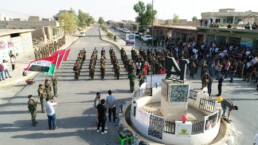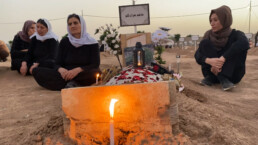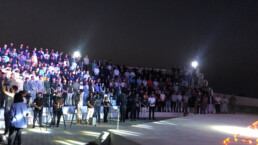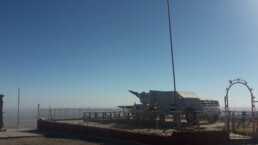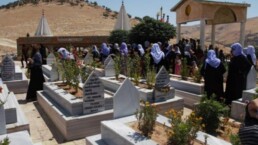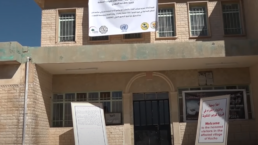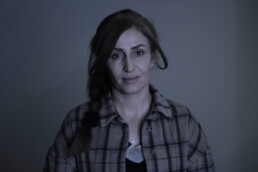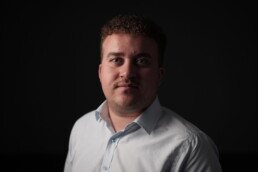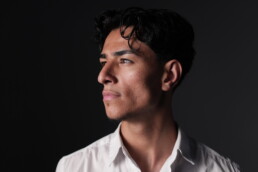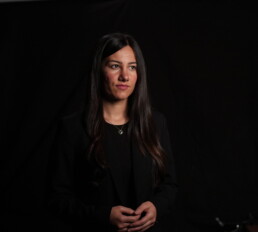Living On
As long as our hearts aren’t satisfied, our wounds will hurt.
— Survivor. In: Yazidi and the on-going genocide. Information Brochure. Women for Justice, 2021, p. 48. (freely translated from German)
The Current Situation
Around 100,000 Yazidis (by 2024) have returned to Sinjar. The siege by and the fight against the Islamic State (IS) destroyed parts of the infrastructure there. Access to water and electricity is not available everywhere. For example, wells were vandalized by IS when pushed back, or the population now lives outside of the original villages, with no water distribution systems. Drilling new wells is difficult and expensive. Security issues are pervasive, such as Turkish airstrikes, political instability and the lack of rule of law in Iraq. Many people have lost their livelihoods by losing vehicles, machines and animals. Unemployment is extremely high.
Women freed by IS are symbolically re-baptized in the Yazidi holy centre of Laliş in Kurdistan Region. However, captivity remains a social stigma that makes it difficult for them to find a spouse. Women are not getting the psychological and medical help they need. There is no women’s clinic in Sinjar. In general, the health system is at a standstill. 2,500 families live in tents. There are legal and social problems, also concerning land rights. IS left landmines in their wake, which Yazidis have repeatedly fallen victim to. A legal and social reappraisal of the genocide is still missing in Iraq. There is still no political status for Sinjar, and it is unclear what will become of the Yazidi armed units that formed after August 2014 and filled the power vacuum. The fact that the Sinjar province is one of the so-called disputed areas, which according to Article 140 of the Iraqi constitution, can decide by referendum whether they want to be administered from Baghdad or Arbil (Kurdistan Region), increases the political tensions between the Iraqi Government and Kurdistan Regional Government, which are competing for Sinjar.
There is a big social trauma. Families are torn apart; some members are in Sinjar, and others have gone to Germany, Canada and Australia through government admission programs. Most Yazidis are in refugee camps in Kurdistan Region/Iraq or Europe. Survivors still do not know if the remains of their family members are in the mass graves in Sinjar, which have been damaged in part by weather conditions or wildlife, leaving remains untraceable. Until today, there is no trace of 2,600 women, men and children in IS captivity. Friendly neighbourhood relations with Arabs are often difficult because Yazidis know or suspect that parts of these tribes have joined IS. The lack of processing and reconciliation makes it almost impossible to rebuild trust.
Wiedereinweihung eines vom IS zerstörten Tempels in Shingal. © Rûdaw TV
Trauma
The post-traumatic stress disorders among Yazidis from Sinjar are well documented as affecting them as individuals and as part of the group. Yazidis understand their suffering as a collective suffering because of their group affiliation. Concerning the IS attacks since 3 August 2014, Yazidis speak of the 73rd genocide. Those referring to the attacks of 14 August 2007, in the districts of Til Ezêr and Sîba Şêx Xidir, which claimed the lives of more than 500 people, speak today of the 74th genocide. There is a historical trauma that spans generations and has been passed on to the next generations. As a non-Muslim group, Yazidis have often faced persecution and discrimination from radical Muslims, living in an environment that lacked security and suffered from religious intolerance. The experience of a historical, collective victim role has become a feature of their identity. The methods of IS, including the murder of men and the enslavement and forced Islamisation of women and children, bring back memories of genocide during the Ottoman Empire.
The consequences of the trauma are heavily influenced by essential questions facing the countries where Yazidis are living today. They evolve around the recognition of the Yazidis, the legal and social reappraisal of the genocide and Yazidi family reunification. It also matters how Yazidis can get involved collectively in decision-making processes. The chance of overcoming the trauma occurs on different levels, influencing each other. For example, internal and external factors can be distinguished in relation to the individual, the group or society.
Mourning and Remembrance
Mourning is carried out by the Yazidis individually and collectively. Since the beginning of the ongoing genocide on 3 August 2014, lamentations have been sung by men and women and mostly distributed via digital channels. Numerous songs, poems, pictures and drawings have been created dealing with what is happening, suffering and grief, as well as wishes for the future. Sinjar has become a symbol for Yazidis worldwide.
On the 3rd August, events to commemorate the genocide on-site or in the digital space are held worldwide. Associations, groups, village communities and even individuals organise commemorative events alone or in cooperation. Over the years, demands to address the legal reappraisal and the reconstruction of and security situation in Sinjar have become louder. A couple of memorial sites have been created by Yazidis in Sinjar.
Poem by Sebra Xaltî
(freely translated from German)
Let’s not forget Sinjar…
Let us stake some minutes
Even if it is just seconds
Let us remember Sinjar
A place of sanctuary and memorial for Yazidis.
Do not forget the mothers and daughters,
Still at the mercy of
The godless perpetrators.
Do not forget the women and girls abducted and enslaved,
Lost in black darkness.
Not the fathers and brothers,
Killed
By the hand of the traitors.
Do not forget the small innocent child,
Hungry on the run,
Desperately looking for the mother.
Do not forget the old man,
Powerless and angry, asking:
‘Why are we paying this high price, yet again?’
Do not forget the sold and passed-on bride,
Desperate of life, robbed of hope and dreams.
Commemoration in Sinjar on 3 August © Faris Mishko
Legal Reappraisal
Thousands of (suspected) supporters of the Islamic State (IS) are in SDF (Syrian Democratic Forces) prisons in the areas under the control of the self-proclaimed Democratic Autonomous Administration of North and East Syria (DAANES), also known as Rojava area. In May 2021, UNITAD (UN investigative team for the prosecution of the crimes of IS) in Iraq described the violence by IS against the Yazidis as genocide. In Iraq itself, there is no criminal offence of genocide. Instead, IS supporters are sentenced under Kurdistan Region´s and Iraq’s anti-terrorist laws. Human rights organizations have criticized the trials in Iraq. Among other things, the rapid trials against the accused mean the opportunity to investigate the crimes fully is lost. The courts in Kurdistan Region and Iraq cooperate little or not at all. Meanwhile, European and other states are discussing the possible repatriation of their nationals who had joined IS and are being held in Syria and Iraq. Yazidi organizations have repeatedly called for an international tribunal to process the genocide in its entirety legally.
The first court case to include the crime of genocide against the Yazidis in the indictment was the case against Iraqi and former IS supporter Taha Al-J. at the Frankfurt Higher Regional Court. This trial began in April 2021 and ended on November 30, 2021, with a verdict confirming charges of genocide and war crimes. The accused was sentenced to life imprisonment. His ex-wife Jennifer W. was sentenced to 10 years in prison by the Munich Higher Regional Court in October 2021. Taha Al-J. is said to have enslaved a Yazidi woman and her five-year-old daughter with his then-wife Jennifer W. The Yazidi child died after being chained and exposed to intense heat.
Amnesty International deemed this process historic. On the one hand, it was the first trial worldwide that took up and dealt with the criminal offence of the genocide against the Yazidis. On the other hand, universal jurisdiction was used for the first time without any direct link to Germany. Taha Al-.J. was arrested in Greece and transferred to Germany. Nevertheless, observers criticized that neither the gender-specific nor religious references to the genocide were discussed during the trial. Nevertheless, the process attracted particular attention, not least because the injured Yazidi was represented by star lawyer Amal Clooney, who had also represented Yazidis in other cases, such as in the lawsuit against the French cement company Lafarge, which was co-financing ISIS and thus stood accused of aiding and abetting crimes against humanity.
Statement by HAWAR.help at the start of the first trial for the genocide of the Yazidis in Frankfurt. © HAWAR.help
German courts have convicted several IS members of crimes against humanity and war crimes in relation to their actions against Yazidis. Next to Taha al-J. and Jennifer W. these are Sarah O., Nurten J., Omaima A., Jalda A., Leonora M. and Romeina S. The trials against Leonora M. at the Higher Regional Court Naumburg and against Sarah O. took place behind closed doors because they were minors at the time of their membership in IS.
The Yazidi witness in the trial against Jalda A.The proceedings at the Hamburg Higher Regional Court against Jalda A. ended in July 2022 with a guilty verdict and a prison sentence of 5 years and six months. One of the IS men, Jalda A. had married held a Yazidi woman prisoner for several weeks in 2017. The court argued that Jalda A. knew that IS was persecuting Yazidis. She internalised the IS ideology and defamed Yazidis as 'dirty infidels'. She contributed to her husband's enslavement of the Yazidis by supervising the Yazidi woman and preventing her from escaping. She sat on the balcony and watched the Yazidi woman being raped. She also physically abused the woman herself, such as by pulling her hair. She banged the Yazidi women's head against the bathroom wall and hit her in the face with a flashlight. In addition to complicity in genocide, the court established that Jalda A. committed crimes against humanity through persecution, enslavement and deprivation of liberty, and complicity in war crimes. In the verdict, the judges explained that the Yazidi woman was sold 15 times and raped by 14 ISIS men. The presiding judge emphasized that without the Yazidi women's testimony, the accused would not have been legally convicted. also testified in the trials against Sarah O.The Yazidi witness commented after the verdict was pronounced: 'I am very grateful to the German judiciary for being so committed to clarifying the crimes that have befallen the Yazidi people and myself, and for putting the members of ISIS on trial. I am concerned with justice for my people and myself, not with the imposition of a particular punishment. There is no punishment for the accused that could undo the suffering. At the end of her sentence, the defendant will be free to live with her family. That has been taken away from me forever.' https://www.doughtystreet.co.uk/news/german-court-hands-down-second-genocide-conviction-against-isis-member-following-enslavement, last accessed on 13.10.22, Nurten J and Omaima A. as the main witness and joint plaintiff. Before Jalda A., she had already been enslaved and mistreated by Sara O., who had enslaved six Yazidi women. She was ‘borrowed’ by Sara O.’s German friends Nurten J. and Omaima A. Jalda A. was in the SDF prison called Camp Hol before being transferred to Germany in October 2021. There, she was arrested, and her criminal proceedings began in April 2022.
According to a report published by the Yazidi Justice Committee in July 2022, at least three states have violated international law concerning the Yazidi genocide: Turkey, Syria and Iraq. It remains uncertain whether charges will be brought against one of these states at the International Court of Justice. In 2019, the umbrella organisation of the Yazidi Women’s Council filed criminal charges against the German government, Minister of Justice Katarina Barley (SPD) and Minister of the Interior Horst Seehofer (CSU), accusing them of not taking action against German ISIS supporters who were imprisoned in Syria. No proceedings were initiated.
Survivors
As part of the Ferman (genocide) against the Yazidis, all those who were in Sinjar (Iraq) on 3 August 2014 and who survived the attacks and the subsequent violence (e.g. abduction and enslavement) of the Islamic State are referred to as survivors. Special media, political and social attention is given to those who were held captive by the Islamic State. Of the original 6,400 enslaved Yazidis, almost half are still in captivity. Others were able to escape the violence through liberation through their own escape attempts or by buying their freedom. Four young Yazidi survivors who have been committed to education and justice for years and who now live in Germany will be briefly portrayed here.
“I want to go out so that the world knows what happened and one day we can see justice. So far we have not received justice regarding Ferman.(…) Justice means that IS will be held accountable and security will be guaranteed so that people can return to Sinjar and their lives will be like before. They have lost their land, their belongings and their families.”
(freely translated from Kurdish)
“My big topic is human rights (…) worldwide, but also in Iraq. (…)The genocide against the Yazidis is and remains my No. 1 focus. I want to continue to do the work that I do as a contemporary witness in school classes, at events or at universities, because I see a purpose. With my work as a contemporary witness, as an IS survivor, I want to show the world what we experienced and what injustice was done to us.”
(freely translated from German)
Farhad Silo
- Born 2002 in Sinjar
- Escape to the Sinjar Mountains on 3 August 2014 after his father was murdered, surrounded by IS in the mountains for a week
- Rescued on 10 August 2014 via a corridor to Kurdish-controled Rojava-admistration areas (Northern Syria).
- Today: 2021 publication of the book `The day my childhood ended`, 2023 high school graduation (Abitur)
“I believe that projects and NGOs can have a huge impact. They can, even if they are small, make survivors feel that they are not alone, that there is someone who thinks about them, who cares about them.”
(freely translated from German)
“I am satisfied with my life here (in Germany) and I am very happy to be here. But to be honest, I do not feel well because I always think about those left behind in Iraq, especially those who live in the camps. I notice and hear that their living condition is not good there. There is nothing I can do about it and they have no other option than to stay in the camps.”
(freely translated from German)

